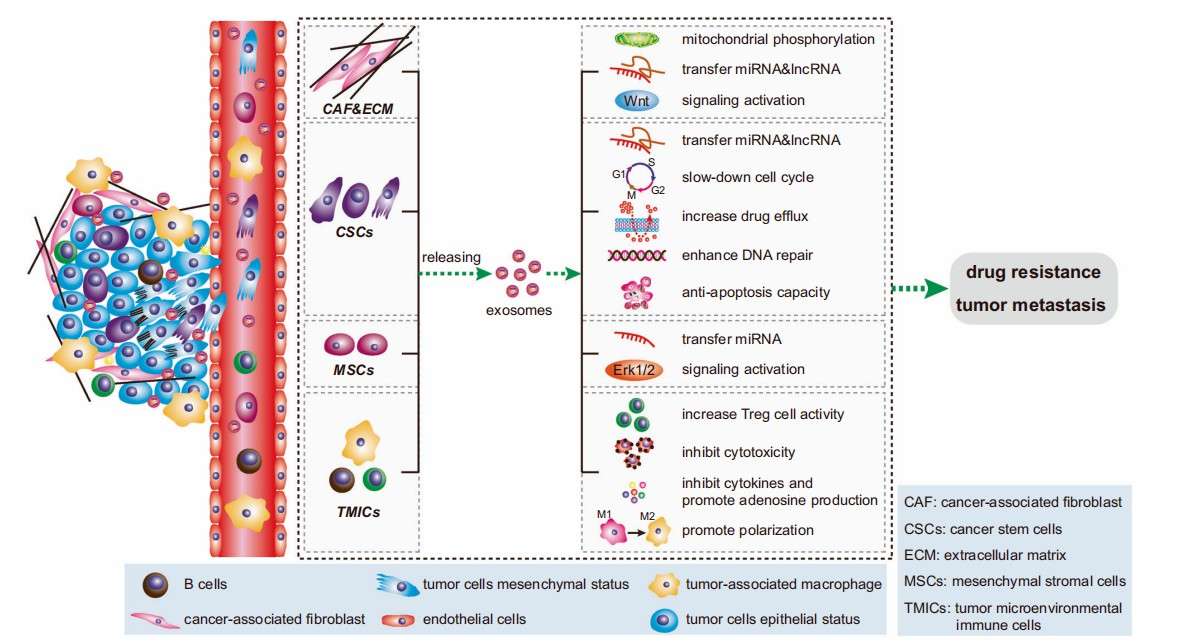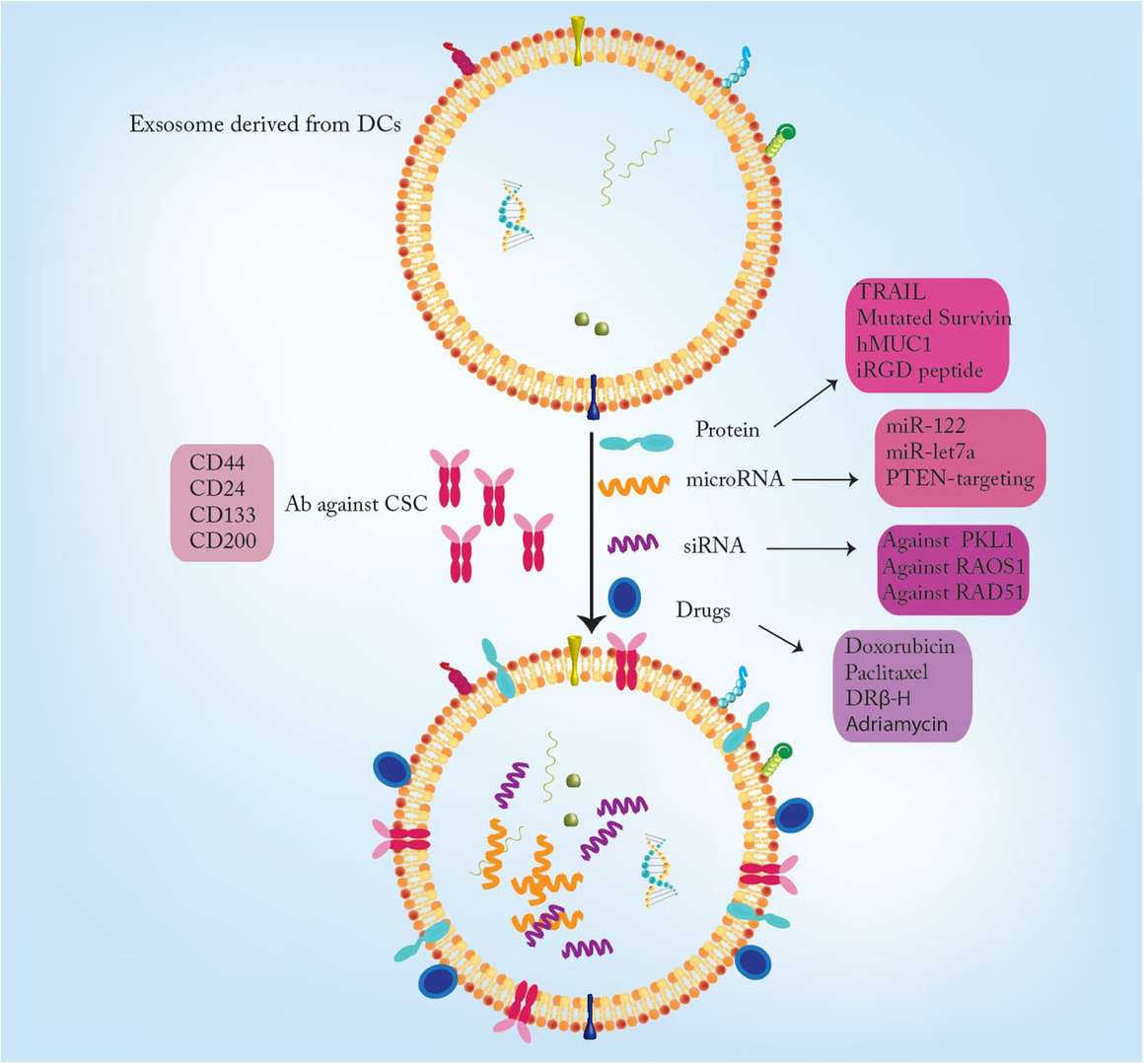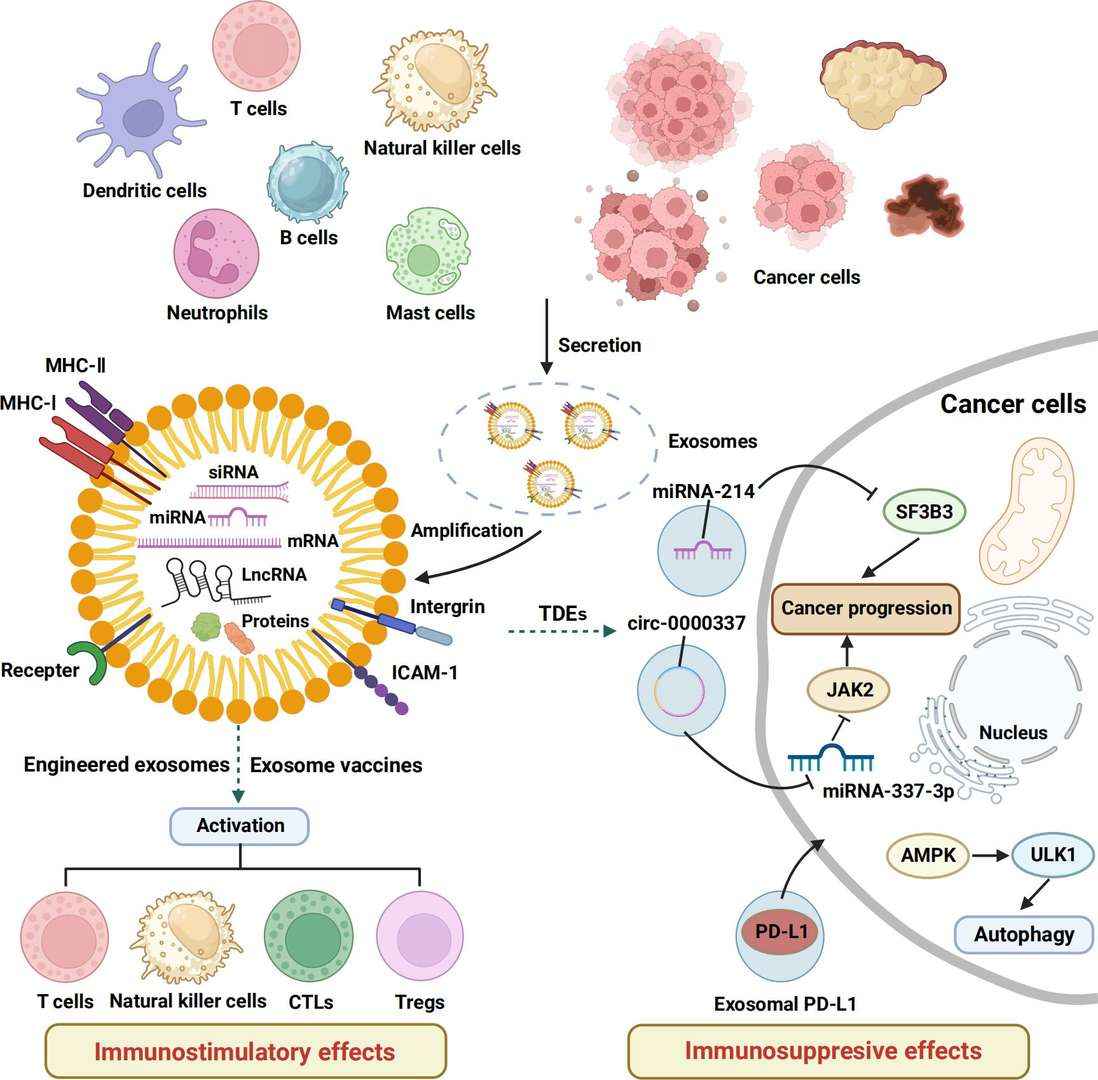The Role of Exosomes in Cancer
Tumor-derived exosomes (TDEs) contain oncogenic proteins and nucleic acids that can facilitate tumorigenesis, metastasis, and angiogenesis by altering the biological responses of recipient cells. Increasing evidence indicates that these exosomes play a critical role in cancer progression. They may serve as prognostic markers and criteria for tumor grading, and have potential as therapeutic targets and drug carriers. The study of exosomes aids in uncovering unknown cellular and molecular mechanisms in cancer, thus advancing cancer treatment.
Role of TDEs in Cancer
TDEs play crucial roles in various stages of tumor formation and progression, including remodeling of the tumor microenvironment (TME), promoting angiogenesis, and contributing to tumor resistance mechanisms.
TDEs in tumor microenvironment remodeling
TME consists of stromal cells, immune cells, and the extracellular matrix, with TDEs being a significant component. These TDEs facilitate the communication between TME and cancer cells, influencing the functions and phenotypes of these cells. TDEs, for example, activate fibroblasts and transform them into cancer-associated fibroblasts (CAFs); CAF-derived exosomes can also facilitate tumorigenesis and enhance antitherapeutic resistance.
TDEs also promote transition between cancer stem cells (CSCs) and non-CSCs triggering epithelial-mesenchymal transition (EMT) and thereby tumor metastasis. Exosomes from mesenchymal stem cells (MSCs) modulate tumor-associated markers and deliver specific microRNAs to recipient cells, in turn driving tumours. Exosomes can also induce anti-tumour immune activity and help recruit and reorganize elements in the TME.
 Fig. 1. Signal transduction pathway of exosomes in tumor microenvironment (Dai J, Su Y, et al., 2020).
Fig. 1. Signal transduction pathway of exosomes in tumor microenvironment (Dai J, Su Y, et al., 2020).
TDEs in angiogenesis
TDEs encode several growth factors including vascular endothelial growth factor (VEGF), fibroblast growth factor (FGF), platelet-derived growth factor (PDGF), transforming growth factor β (TGF-β), tumor necrosis factor α (TNF-α), and Interleukin-8 (IL-8). Such growth factors can cause endothelial cells to grow and migrate, thereby creating new vascular networks.
TDEs in tumor drug resistance
Cancer cells that are drug resistant might secrete chemotherapeutic drugs inside exosomes, so that they release anticancer drugs from the cell. Further, TDEs play an important role in the chemotherapeutic activity of cancer cells, as well as cancer cells' immune escape.
Applications of Exosomes in Cancer Therapy
With exosomes being central to both the onset and progression of cancer, there are many potential exosome cancer therapies, including the application of exosomes as carriers for drug delivery or immunotherapy, targeted therapy to inhibit exosomal formation and release, and liquid biopsy with exosomal biomarkers.
Drug delivery
As natural messengers, exosomes can act as an intermediary between cells or tissues. Exosomes allow anti-cancer agents to be delivered directly to the tumour cells, providing selective, targeted treatment while sparing healthy tissue. Exosomes, for instance, carry transmembrane and membrane-anchored proteins that promote endocytosis and boost anti-cancer therapies. Various cancer drugs, including doxorubicin and paclitaxel, have been injected through exosomes to treat cancer in ways that are dozens of times toxicer to cancer cells than free therapies. Furthermore, miRNA-122 delivered through exosomes induces apoptosis in hepatocellular carcinoma cells, and engineered exosomes carrying the apoptotic ligand TRAIL target and eliminate cancer cells.
 Fig. 2. Exosome application in cancer therapy (Mashouri L, Yousefi H, et al., 2019).
Fig. 2. Exosome application in cancer therapy (Mashouri L, Yousefi H, et al., 2019).
Immunotherapy
Exosomes exhibit dual roles in tumor immunomodulation, either suppressing or stimulating immune responses. Thus, exosomes can function as antigen delivery systems, activating anti-tumor immune responses. Exosomes containing MHC I, MHC II, CD86, and HSP70-90 chaperone proteins can trigger CD4+ and CD8+ T cell activation, mediating tumor immune responses and overcoming the challenge of weak tumor antigenicity.
 Fig. 3. The immunostimulatory and inhibitory effects of exosomes (Xie J, Zheng Z, et al., 2023).
Fig. 3. The immunostimulatory and inhibitory effects of exosomes (Xie J, Zheng Z, et al., 2023).
Targeted therapy
By suppressing exosome formation and release, or the binding of exosomes to the target cell, you can prevent cancer cells from growing and spreading.
Liquid biopsy
Exosomes are also found in blood, saliva, tears and urine. The evidence mounts that exosomes are rich in disease proteins and nucleic acids that are differentially expressed in different tumours. CD63, for example, is highly expressed in ovarian cancer exosomes; CD317 and the epidermal growth factor receptor (EGFR) are highly expressed in non-small cell lung cancer (NSCLC) exosomes; miR-15a-5p is highly expressed in endometrial cancer exosomes. Such findings indicate that the contents of exosomes can predict the disease state of the parent cell and thus enable tumour differentiation by the expression of a specific exosome.
| Products & Services | Description |
| Exosome Analysis | Creative Bioarray provides diverse exosomal species analysis to help you understand your exosome compositions. |
| Exosome Identification | Creative Bioarray provides comprehensive support for your exosome identification by including the morphology assay, purity, and quantity assay, particle size distribution analysis, and exosome-specific markers expression. |
| Exosome Isolation and Purification | Creative Bioarray provides reliable techniques for exosome isolation from different sample matrices. We also provide exosome isolation using specified techniques if required by customers. |
References
- Dai J, et al. Exosomes: key players in cancer and potential therapeutic strategy. Signal Transduct Target Ther. 2020, 5 (1), 145.
- Mashouri L, et al. Exosomes: composition, biogenesis, and mechanisms in cancer metastasis and drug resistance. Mol Cancer. 2019, 18 (1), 75.
- Xie J, et al. Recent advances in exosome-based immunotherapy applied to cancer. Frontiers in immunology, 2023, 14, 1296857.

